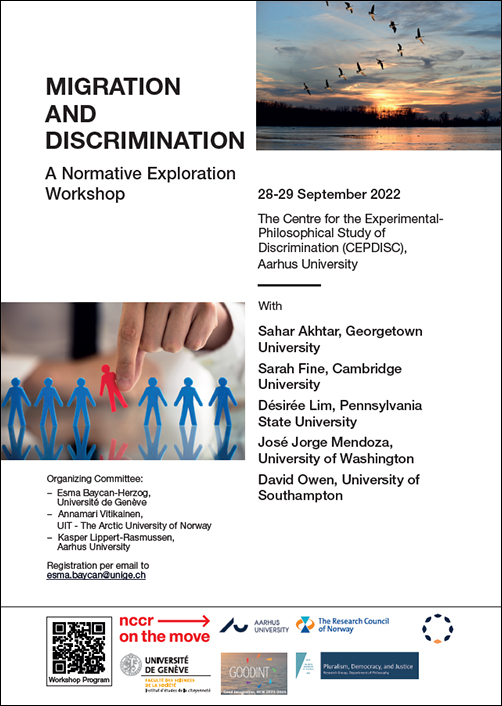Migration and Discrimination: A Normative Exploration Workshop
Migration and Discrimination: A Normative Exploration Workshop
Centre for the Experimental-Philosophical Study of Discrimination, Aarhus University
28 September 2022
Connected to the Good Integration Project Workshop on 29-30 September 2022

When it comes to the ethical dilemmas of immigrant admission and integration, it is not clear whether or to what extent discrimination is relevant. On the one hand, the citizens of migration origin are proper subjects of discrimination, and various state policies such as access to labor market, welfare state benefits and social services should not be organized in a way that discriminate them. On the other hand, when it comes to would-be immigrants and resident foreign nationals, theories of discrimination seem to be less well suited to address the issue of people who are ‘formal non-members’. By recognizing explicitly traits such as sexual orientation, race, and religion, but not so much “citizenship” and “nationality”, the literature on discrimination is implicitly limited by the domestic scope of justice.
Against this background, ethical questions of migration include both domestic and global scopes of justice. Hence, they raise normative challenges to the literature in discrimination. Scholars working on ethics of migration do not hesitate to argue that for various reasons, state policies treating people differentially according to their citizenship are directly or indirectly discriminatory. Yet, it is not clear what normative added-value discrimination has vis-à-vis the arguments based on e.g. equality of opportunity or human rights.
This workshop addresses issues of migration and integration – both from the perspective of theories of discrimination and from the perspective of migration ethics. We specifically welcome contributions that articulate conceptual advantages, challenges and refinements of linking these separate debates. Also, we encourage reflection on fundamental questions such as:
- Is the existence of differential right regimes between status citizens and foreigners (a) in and of itself; or (b) under certain specific circumstances or (c) never an instance of wrongful discrimination? Why?
- Given the existence of the differential distribution of migration and mobility rights at the global level—e.g. Henley Passport Index, does the global migration regime wrongfully discriminate against certain groups of people? If so, what is the moral wrong at stake?
- Which specific types of discrimination (numerical, institutional, structural etc.) are relevant to capture the various questions (naturalization, citizenship tests; linguistic proficiency-accents; access to social services) in the ethics of immigration debate?
The workshop is co-organized by The Institute of Citizenship Studies, University of Geneva (NCCR-On the Move); Centre for the Experimental-Philosophical Study of Discrimination, Aarhus University and Pluralism, Democracy and Justice Research Group, Arctic University of Norway.
Organizers:
Esma Baycan-Herzog; Kasper Lippert-Rasmussen; and Annamari Vitikainen.
